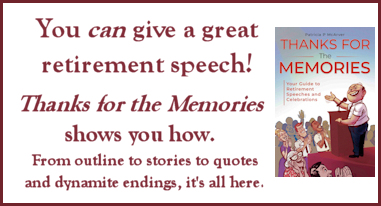Retirement party planning
 Image by Jungyeon Min, Pixabay
Image by Jungyeon Min, PixabayWhen you are doing the retirement party planning, you want to honor the retiree, acknowledge the person's contributions and give everyone a few laughs. An occasional tear is okay too since you're marking the moment when the office or organization will change because of the retiree's departure.
Retirement party planning involves figuring out how to celebrate the high points of a retiree's work life and bring together former and current friends and colleagues who contributed to the retiree's success.
In planning the retirement party, think about the dynamics of the work place, the people you served and the changes that have taken place. All of these factors can contribute to special speeches or toasts that honor the work of the departing colleague.
Some basics in retirement party planning
Choose a theme that salutes the retiree's interests or the identity of the organization. Fun themes could be a favorite song, TV show or book if the retiree identifies with something in pop culture. Or, as is most often the case, the theme will reflect the profession or business. Once you have decided upon a theme, you will have a neat way to coordinate invitations, paraphernalia and table decorations.
Think about simple objects that might be whimsical but can generate conversation:
- a report card for a retiring teacher
- golf balls, plastic fish or a creative spreadsheet for a retiring businessman
- picture postcards, suntan lotion or makeshift tickets for a retiree who wants to travel
- open handcuffs or whistles for a retiring police officer
- small flags for a military retiree.
Consider the guest list. Even small gatherings should include the spouse and/or close family members of the retiree. In addition to coworkers and others such as vendors who work closely with the retiree, you may also want to include former colleagues and bosses.
Encourage people to leave messages. Have a guestbook or perhaps some blank cards that people can sign in and write wishes for the retiree. A popular option in many fields is to print a poster or picture with wide borders and room for guests to sign around the edges. Here's a great example on Pinterest.
Gather memorabilia to display. Videos or slideshows are popular at larger retirement parties but they are not necessary. If you are on a time budget or trying to have a small gathering at the office, you can arrange a table displaying photos or mementos that mean something to the person being honored. You might create a book or album with pictures from the retiree's work and encourage guests to write notes on a page that best matches them and their relationship to the retiree.
If you have a large gathering, you could print a calendar and ask people to sign on their birthday with a message so that memories will be distributed throughout the months.
Think about a program. In retirement party planning, you don't necessarily need a formal agenda but you if you need to plan for a flow of activities. Certainly there will be some special speeches.
Ask one or two people who worked closely with the retiree to make a few remarks. Make your request at least a couple of weeks before the party. Give them a time limit of three minutes in the hopes that they will take no more than five. Others may want to speak but it's wise to have a couple of people prepared with special speeches. The retiree will also want to say something. (See When you are the Retiree)
Designate someone to act as a host or greeter at the door, especially if people are coming who are not known to everyone. It's important to have guests enter and then keep moving . . . to sign a guestbook, to get a drink, etc. so you won't have a large number of people congregating just inside the door.
Remarks should probably begin no more than 20-30 minutes after the start time of the reception or during dessert if dinner is being served. That way guests won't be waiting a long time and those who are only able to drop by will have a chance to speak to the retiree before the start of speeches.
Think about the big picture.
You can often get public officials to write letters of congratulation that can be read at the retirement party. If you plan ahead, you can probably get something from the mayor, and your local congressman or state representative. You might even try for the governor or the president. (After all, the worst that can happen is that they will say No.) Most public officials are happy to comply but they usually need a great deal of lead time to get a letter to you.
If there are other people who are significant to the retiree who might not be able to attend -- past bosses, company officials, members of the clergy, professional associates, the governor, the president -- consider asking them for a congratulatory letter. Go to their web sites or call their offices to make contact.
Don't stress over details. The important thing for a retiree to know is that he or she is appreciated for what they have contributed to the organization and that they will be missed. It's really that simple.
All advice on this site was written by humans. No copy was written by AI.
Please support real writers.












